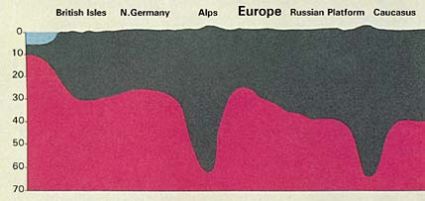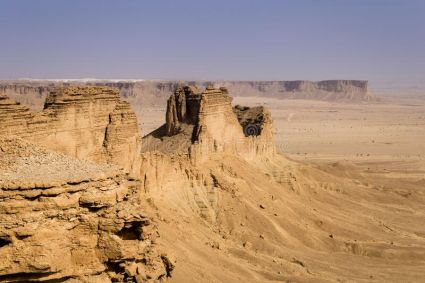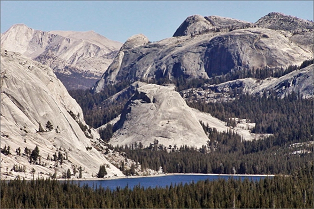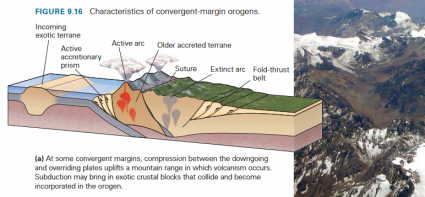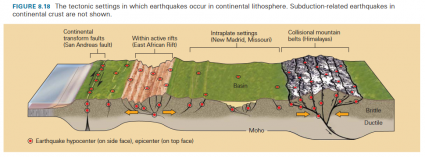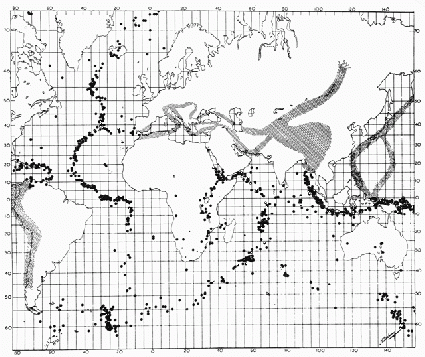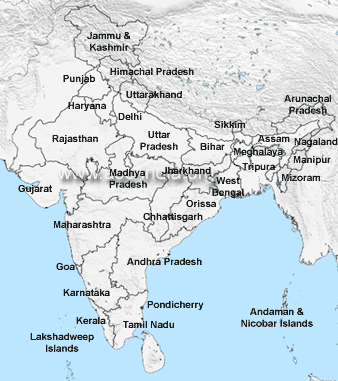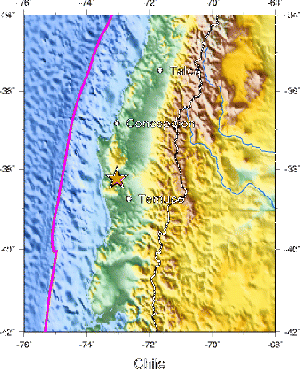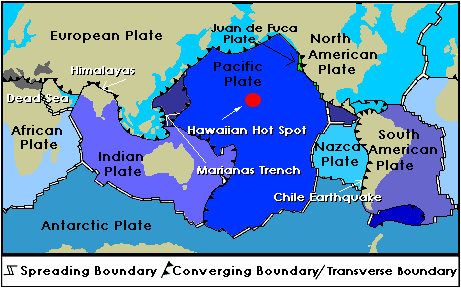The Quran and Mountains: Difference between revisions
| [checked revision] | [checked revision] |
m (→Earth anchored by mountains in early or pre-Islamic poetry: Linked the page on cosmic oceans to this one.) |
|||
| Line 65: | Line 65: | ||
Though the idea of mountains preventing the world from shaking is far more ancient, being found even in much earlier Vedic texts,<ref>[https://www.britannica.com/topic/Veda Veda] | Hinduism | Britannica Entry | Though the idea of mountains preventing the world from shaking is far more ancient, being found even in much earlier Vedic texts,<ref>[https://www.britannica.com/topic/Veda Veda] | Hinduism | Britannica Entry | ||
''..No definite date can be ascribed to the composition of the Vedas, but the period of about 1500–1200 BCE is acceptable to most scholars..''</ref> along with a similar creation story of the [[Scientific Errors in the Quran#Earth%20and%20heavens%20torn%20apart|Earth and sky being split]] in {{Quran|21|30}} and cosmic waters, with all three being folklore of ancient people.<ref>Witzel, E.J. Michael. The Origins of the World's Mythologies (p. 137). Oxford University Press. | ''..No definite date can be ascribed to the composition of the Vedas, but the period of about 1500–1200 BCE is acceptable to most scholars..''</ref> along with a similar creation story of the [[Scientific Errors in the Quran#Earth%20and%20heavens%20torn%20apart|Earth and sky being split]] in {{Quran|21|30}} and [[:en:A_Barrier_Between_Two_Seas_and_the_Cosmic_Ocean|cosmic waters]], with all three being folklore of ancient people.<ref>Witzel, E.J. Michael. The Origins of the World's Mythologies (p. 137). Oxford University Press. | ||
''Footnote 289 (p. 470): Ṛgveda 1.19.7 etc.; Maitrāyaṇī Saṃhitā 1.10.13; Kaṭha Saṃhitā 36.7 (see above, § 2, n. 167; § 3, n. 283. Note that both the stemming part and the fixing of the Earth occur much later in mythological time than that of Heaven and Earth. Indra is a descendant of the second generation of deities. If we count the Asuras or Titans as the third generation, they are in fact the cousins of the “fourth” generation, to which Indra belongs. In Japan, the feature of preparing the land for habitation occurs again later on (cf. Aston 1972: 59). Probably in both traditions, myths were restructured restructured and attributed to the most important gods.''</ref> | ''Footnote 289 (p. 470): Ṛgveda 1.19.7 etc.; Maitrāyaṇī Saṃhitā 1.10.13; Kaṭha Saṃhitā 36.7 (see above, § 2, n. 167; § 3, n. 283. Note that both the stemming part and the fixing of the Earth occur much later in mythological time than that of Heaven and Earth. Indra is a descendant of the second generation of deities. If we count the Asuras or Titans as the third generation, they are in fact the cousins of the “fourth” generation, to which Indra belongs. In Japan, the feature of preparing the land for habitation occurs again later on (cf. Aston 1972: 59). Probably in both traditions, myths were restructured restructured and attributed to the most important gods.''</ref> | ||
| Line 248: | Line 248: | ||
Thought the word 'lest' has fallen out of fashion in modern English,<ref>[https://www.bbc.co.uk/worldservice/learningenglish/radio/specials/1535_questionanswer/page68.shtml BBC World Learning Service]. Q&A.</ref> it's meaning is: ''in order to prevent any possibility that something will happen'',<ref>Cambridge Dictionary: [https://dictionary.cambridge.org/dictionary/english/lest Lest]</ref> i.e. to stop it from happening. It also be translated as 'otherwise' in these contexts. You can see used elsewhere where you can see [https://corpus.quran.com/search.jsp?t=1&q=lest here], for example: | Thought the word 'lest' has fallen out of fashion in modern English,<ref>[https://www.bbc.co.uk/worldservice/learningenglish/radio/specials/1535_questionanswer/page68.shtml BBC World Learning Service]. Q&A.</ref> it's meaning is: ''in order to prevent any possibility that something will happen'',<ref>Cambridge Dictionary: [https://dictionary.cambridge.org/dictionary/english/lest Lest]</ref> i.e. to stop it from happening. It also be translated as 'otherwise' in these contexts. You can see used elsewhere where you can see [https://corpus.quran.com/search.jsp?t=1&q=lest here], for example: | ||
{{Quote|{{Quran|7|127}}|And (remember) when your Lord brought forth from the Children of Adam, from their loins, their seed (or from Adam's loin his offspring) and made them testify as to themselves (saying): "Am I not your Lord?" They said: "Yes! We testify," lest (أَن) you should say on the Day of Resurrection: "Verily, we have been unaware of this."}} | {{Quote|{{Quran|7|127}}|And (remember) when your Lord brought forth from the Children of Adam, from their loins, their seed (or from Adam's loin his offspring) and made them testify as to themselves (saying): "Am I not your Lord?" They said: "Yes! We testify," lest (أَن) you should say on the Day of Resurrection: "Verily, we have been unaware of this."}} | ||
No-one would ever claim mountains actually prevent earthquakes altogether, considering they do not and in fact given the correlation between them and mountain ranges ([[The Quran and Mountains#Mountains prevent the Earth from moving / convulsing / inclining|see above]]), nor any of the nice alternative processes are described as being stopped altogether. The apologists have essentially used a subtle substitution of 'lest' meaning to ''prevent or stop'', to ''lower/reduce'', yet the Qur'an does not say 'reduce/lower shaking' etc.,<ref>E.g. see alternative Arabic words for reducing that could have been used if that is what it meant here: [https://dictionary.cambridge.org/dictionary/english-arabic/reduce Cambridge English to Arabic dictionary] and here: [https://www.arabicstudentsdictionary.com/word?word_id=b4b95ee3-4477-4df5-b43a-7dba8a4a5c7f&root_id=d734198e-e468-41a4-b6b7-3f7904ced653&action=wordLink Arabic Student's Dictionary]. This does not even include potential metaphors that could have been used to express lowering.</ref> nor does the Qur'an say mountains prevent the Earth shaking/swaying ''a lot'' - so we would expect to see no shaking/swaying from whichever alleged natural process this is referring to rather than simply a minor reduction - making the entire argument invalid. | No-one would ever claim mountains actually prevent earthquakes altogether, considering they do not and in fact given the correlation between them and mountain ranges ([[The Quran and Mountains#Mountains prevent the Earth from moving / convulsing / inclining|see above]]), nor any of the nice alternative processes are described as being stopped altogether. The apologists have essentially used a subtle substitution of 'lest' meaning to ''prevent or stop'', to ''lower/reduce/diminish the effect of'', yet the Qur'an does not say 'reduce/lower shaking' etc.,<ref>E.g. see alternative Arabic words for reducing that could have been used if that is what it meant here: [https://dictionary.cambridge.org/dictionary/english-arabic/reduce Cambridge English to Arabic dictionary] and here: [https://www.arabicstudentsdictionary.com/word?word_id=b4b95ee3-4477-4df5-b43a-7dba8a4a5c7f&root_id=d734198e-e468-41a4-b6b7-3f7904ced653&action=wordLink Arabic Student's Dictionary]. This does not even include potential metaphors that could have been used to express lowering.</ref> nor does the Qur'an say mountains prevent the Earth shaking/swaying ''a lot/heavily etc'' - so we would expect to see no shaking/swaying from whichever alleged natural process this is referring to rather than simply a minor reduction - making the entire argument invalid. | ||
And once again, critics note that the language used here perfectly matches a pre-modern worldview of mountains being tent pegs holding down a flat Earth that outright stops it from swaying (given the lack of understanding of physics at the time of revelation), either in space or the cosmic ocean. | And once again, critics note that the language used here perfectly matches a pre-modern worldview of mountains being tent pegs holding down a flat Earth that outright stops it from swaying (given the lack of understanding of physics at the time of revelation), either in space or the cosmic ocean. | ||
Revision as of 21:15, 30 December 2024
This article or section is being renovated. Lead = 4 / 4
Structure = 4 / 4
Content = 4 / 4
Language = 4 / 4
References = 4 / 4
|
The Quran has a particular conception of the nature of mountains, their formation, and the geological role they play that is is referenced in multiple verses. In recent times, many Islamic scholars have argued that this conception is both scientifically sound and an instance of miraculous scientific foreknowledge on the part of the Quran which, they argue, could not have arrived at the conception it holds without divine insight. Individuals key to the popularization of this idea include the apologist Zakir Naik and the Saudi-financed surgeon Dr. Maurice Bucaille.
Parties advocating the description of mountains found in the Quran as a scientific miracle identify two key claims made in the scripture: (1) that Mountains can be described as 'pegs' and (2) that mountains play some role in 'stabilizing the Earth' - these two ideas, advocates hold, are evidence of a miraculous scientific insight. Critics challenge the advocates' interpretations of the relevant verses as well as their use and presentation of scientific information on the topic, arguing instead that the Quran is erroneous in these respects. Critics further claim that the Qur'an is scientifically inaccurate in its description a specific time period in which mountains were supposedly formed and Allah having cast them into the earth.
Formation of mountains in the Quran
Stage in the creation account
The above verses are the Quranic six day creation account. In this description, mountains are created within a four day period (which is usually understood to overlap with the first two day period mentioned in the creation account). Critics note that rather than being confined to a closed period, mountain formation began early in Earth's history due to the process of plate tectonics (with accompanying earthquakes), has continued for billions of years, and continues to do so now and into the future. With each plate collision mountains keep on rising higher little by little. And when the plates start to move away from each other, then these mountains start to erode until after millions of years, they completely disappear. On a geological timescale, mountains are not "firmly set", but rather they rise and fall, and are replaced by other mountain ranges over time. For example, there existed no Mount Everest 250 million years ago. The Himalayan mountain range began to grow when two continental plates collided, which will eventually separate again and Everest will gradually erode and disappear completely.[1]
It is also worth noting that in Sahih Muslim 39:6707, Muhammad elaborates that mountains were created on the second day (Sunday), which is even more specific. Other hadiths quoted by Ibn Kathir in his exegesis for Quran 22:47 ("a day with your Lord is like a thousand years") reported Ibn 'Abbas as stating that each of the six days in which Allah created the heavens and the earth was a thousand years.[2] On this basis (and the similar verse Quran 70:4 about fifty thousand years), advocates argue that "day" (yawm) should not be taken literally. Critics argue that this is a synthesis not apparent in the creation account itself, and in any case 1000 or 50000 years would not indicate that the author was aware of the sheer scale of geological and cosmological time (billions of years).
Casting mountains into the earth
The Quran states that the mountains on Earth's surface were cast upon it by God. The imagery is clear when one considers the verse discussed further below which describe the mountains as 'pegs'.
The word 'he has cast' is alqā (from the root lam-qaf-ya), which in this form (Arabic verb form IV) is frequently used elsewhere in the Quran to mean throw or cast.[3] It is the same word as is used in Quran 3:44 when lots are cast using pens (it would be easy to imagine that mountains were similarly scattered, though perhaps should not be taken too literally in this context), and Quran 12:10 when the prophet Yusuf is cast down into the well, and in Quran 20:20 when Moses casts down his staff, which becomes a snake.
The other verses using alqā in the context of mountains are Quran 15:19 and Quran 50:7 which both begin with "And the earth - We spread it out and cast therein firmly set mountains..." and Quran 31:10 "He created the heavens without pillars that you see and has cast into the earth firmly set mountains, lest it should shift with you, and dispersed therein from every creature. And We sent down rain from the sky and made grow therein [plants] of every noble kind." In all of these verses the words "firmly set mountains" is rawāsiya in the Arabic text. This word for mountains is from the same Arabic root as words meaning firmly set, steadfast, anchored or anchors.[4] Perhaps the connection with anchors is intended as part of a poetic picture alongside the verb alqā meaning casting or throwing.
A very similar verse to Quran 16:15 quoted above is Quran 21:31, which instead of alqā uses the verb jaʿala (made or placed)[5]. See also Quran 27:61 where Allah is said to have made (jaʿala) the earth an abode, and made (jaʿala) in its midst rivers and firmly set mountains, and a barrier between the two seas. Jaʿala is also used in the statement about mountains as pegs discussed in the next section below (Quran 78:6-7) and which uses another word for mountains, jibāla.
Again, mountain formation is described in all these verses only as a past event. However, according to modern science, mountains were not placed or cast into the earth's surface, but rather they are byproducts of an ongoing process driven by plate tectonics in which continental and oceanic crust plates slowly move over time, driven by 1) mantle convection currents, 2) by ridge push as buoyant magma upwells at oceanic ridges, and 3) by slab pull, as the leading edges of plates sink at subduction zones, cooling and pulling the rest of the plate behind. A number of processes can result in the gradual formation and disappearance of mountain ranges (often accompanied by earthquakes). Such processes include when the collision of two continental plates results in a thickening of the crust, or when an oceanic plate subducts underneath a continental plate, resulting in volcanic mountain formation and an accretionary wedge, or mountains formed by fault blocks or tilted block faulting (see illustrations below). Eventually, erosion causes the mountain range to disappear as has happened many times over the eons. The implication of the Quranic verses are instead that Allah cast or placed mountains by special creation in certain locations rather them being a byproduct of a larger ongoing process (tectonic movements).
Some critics also note that in another verse, Quran 41:10 discussed above, says Allah placed (jaʿala) on the earth mountains "from above it" (min fawqiha من فوقها), though almost all modern official translations interpret the Arabic simply to mean the mountains are above the earth's surface.[6] Either interpretation seems possible based on how the preposition with noun are used in some other verses - see for example Quran 6:65, Quran 29:55 or Quran 33:10, though on the other hand Quran 39:16 and Quran 39:20.
Mountains as pegs
The Quran makes a claim about mountains in general - that they are made as pegs or stakes. This is stated in the context of the Earth as a wide expanse (mihadan مِهَٰدًا (same as مَهْدًا mahdan in the similar verses Quran 20:53 and Quran 43:10), which means a cradle or bed; a plain, even, or smooth expanse.[7]).
The word for mountains in this case is jibāla and the word translated as pegs is awtādan, which means pegs or stakes placed in the ground[8] It also occurs in reference to Pharaoh's "stakes" in Quran 38:12 and Quran 89:10, sometimes related in exegesis to the crucifixions he is said to have ordered in other verses, though the preceding context around the latter of those two verses makes clear that there l-awtād refers to some kind of lasting rock-hewn monuments.
See also Quran 15:19, Quran 16:15, Quran 21:31 and Quran 31:10 (discussed further below in the context of stabilising the earth) which all mention Allah casting rawaasiya (steadfast, immovable, anchors, i.e. mountains)[4] in the earth. Critics would reiterate here that mountains do move over geological time.
An important observation is that the verse is phrased as a question: "Have We not made [...] the mountains as pegs?". Therefore, the author is referring to a concept which he assumes even the Quran's initial audience will understand.
Earth anchored by mountains in early or pre-Islamic poetry
The pre-Islamic poet commonly known as al-Muhalhil, "The poem weaver", whose name was Abu Layla Adi ibn Rabi'ah at-Taghlabi (d. 531 CE), composed a number of famous poems. While possibly post-Quranic, some lines from one poem attributed to al-Muhalhil uses some of the same terminology as the Quranic verses in terms of mountains and the earth shifting/convulsing:
They told us Kulaib was dead, and I said:
مادت بنا الأرض أم مادت رواسيها
The next lines of the poem go on to mention the heaven falling and some words about the earth. The above quoted extract uses the word rawāsiya (firmly set mountains), which occurs also in some Quranic verses and whose root has an association with anchoring and anchors as discussed above.[4]. It also uses the verb mādati (shift/convulse/incline, which appears in the form tamīda in those same Quranic verses as discussed below).[12] In this poem, it is the earth in its entirety whose mountains are involved in preventing it from shifting, which is indicative for the most straightforward reading of the equivalent Quranic verses i.e that they refer to the earth as a whole. Those verses claim that Allah cast mountains into the earth "lest it shift [tamīda] with you", as discussed in the section further below on the alleged role of mountains preventing earthquakes in one interpretation.
Also perhaps relevant is a poem about the creation of a flat earth attributed to the pre-Islamic poet Zayd b. 'Amr, who reportedly was a monotheist who met Muhammad before his prophetic career began. The poem is recorded in the biography of Muhammad by Ibn Ishaq (d. 767 CE) and must pre-date that work.[13] Much like Quran 79:27-33, the poem says "He spread it out" (daḥāhā[14]) i.e. the earth, then even clearer than the Quran, saw that it was level (استوت istawat[15]) on the water (i.e. flat), "and set firm the mountains on it" (arsā ʿalayhā l-jibālā, very similar to wa-l-jibāla ʾarsāhā in verse 79:32 of the Quranic passage).
daḥāhā falammā raʾādā istawat ʿalā l-māʾi arsā ʿalayhā l-jibālā
He spread it out and when He saw that it was settled upon the waters, He fixed the mountains upon itThough the idea of mountains preventing the world from shaking is far more ancient, being found even in much earlier Vedic texts,[18] along with a similar creation story of the Earth and sky being split in Quran 21:30 and cosmic waters, with all three being folklore of ancient people.[19]
Alleged peg-like structure of mountains

The schematic diagram taken from page 220 of Anatomy of the Earth by the French geologist Cailleux is cited by various sources advocating the reality of the proposed miracle.[21] The basic underground protrusion of the crust beneath the mountainous region of the Alps, according to miracle advocates, appears as a sort of peg embedded in the lower layer of the Earth. This, the advocates suggest, coheres with Quran 78:6-7 which reads, “Have We not made the earth as a wide expanse, And the mountains as pegs?” The geological phenomenon observed is known as isostasy. This term describes the dynamic by which thickening of the crust results in mountains rising above ground level, compensated for by an increase in the depth of the crust into the lower part of the lithosphere (upper mantle) in the same area, maintaining isostatic equilibrium.
Thus, elevation above sea-level tends to correlate positively with the thickness of the Earth's crust at any given place. The reason why the crust tends to exist in this manner is compared to the same physics of floatation whereby the majority of an iceberg suspended in water extends below sea level and, at the same time, it is the case that the taller the portion of ice above sea level, the deeper the iceberg dips down below.
Advocates of the scientific miracle argue that isostasy means that mountains have peg-like structures and that this is what was meant by the Quran.
Critics respond to this in a number of ways. Firstly, as noted above, the verse itself assumes that its 7th century listeners understand what is meant, so it can hardly be referring to advanced geological concepts: "Have We not made [...] the mountains as pegs?"
Secondly, they note that the caption associated with the diagram found in Cailleux's book explicitly points out that the visual representation has had its 'vertical scale greatly exaggerated'. Other visual representations with less exaggerated and more accurate vertical scales, some of which are cited by the advocates themselves, do not depict mountains as in any way resembling pegs.[21]
Thirdly, such images represent a cross section of a mountain range, not individual mountains. These crustal root structures (also called mountain roots) occur at the level of entire ranges which can be thousands of kilometres long and only a few tens of kilometers deep. The entire mountain range whose dominant feature is its length protrudes relatively slightly into the upper mantle, unlike a peg whose depth is greater than its width. Some images of actual crustal roots underlying famous mountain ranges are shown below.
Fourthly, critics point out that unlike pegs which are foreign objects placed into something else, mountains caused by plate collisions or faults are of continuous material as the surrounding crust, albeit contorted or faulted into different shapes due to geological processes. Furthermore, plateau mountains (including mesas and buttes) such as those of the Najd Plateau in Saudi Arabia (illustrated below) are caused by the erosion of surrounding material so can hardly be described as having been placed there.
Fifthly, an effect called uplift maintains the height of mountains for some time even as erosion occurs, by reducing the depth of the crustal root. This is because the thickened subterranean crust is nevertheless buoyant relative to the molten mantle, so it thrusts upwards as erosion lightens the weight above, maintaining isostatic balance and eventually resulting in normal crustal thickness.[22]
Sixthly, some argue that the concept of a subterranean aspect of mountains is found already in the Bible and may in some form have been adopted by Muhammad, if that is indeed the meaning in the Quran.
Root structures of some actual mountain ranges
In the below model of a section of the Ural mountains range based on gravity and seismic data, it can be seen (even despite the exaggerated vertical dimension) that there is nothing peg or stake-like about the crust layer in which isostasy occurs.
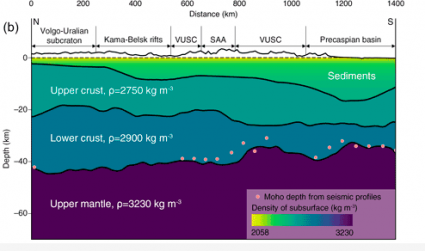
The below crustal cross sections of the Alps show a type of mountain range root formation resulting from subduction during continental crust collision. The present height of the mountains are shown in the solid line slightly above sea level. It is important to note that these are cross sections of a formation which continues all along the length of that part of the plate boundary. Hence even with the most generous imagination, this process does not resemble a peg or stake.
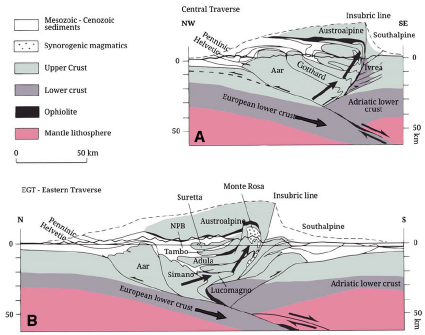
The two cross-sections shown below are across the Apennine mountain range of Italy. Notice the non-peg-like structure of the mountains which protrude slightly above the surface in these images, which have comparable vertical and horizontal scales.
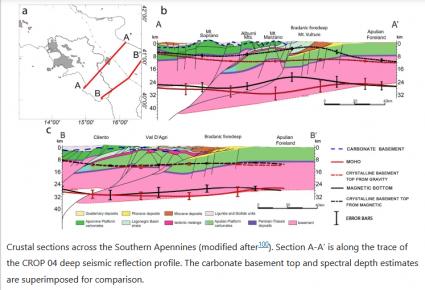
The below three-dimensional model of the Calabro-Ionian subduction zone near Sicily has a cutaway illustrating the nature of the lithospheric slab containing a mountainous landscape.
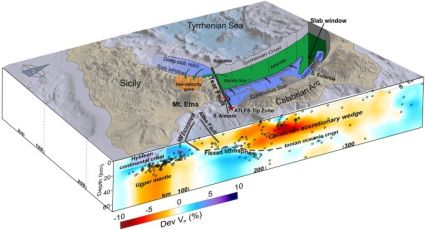
Types of mountain without crustal roots
Besides pointing out that the crustal roots (also called mountain roots) described by isostasy do not resemble pegs in either form or function, critics also point out that isostasy, while often observed, is by no means universal and there are several outstanding examples of mountain ranges and other elevated geological structures which have no such roots.
Mountain formation can occur in a number of ways, not all of which involve the formation of crustal roots nor any other structure that can reasonably be claimed to resemble pegs (if any). Mountain formation with crustal thickening can result from a number of processes including folding, thrust faulting, metamorphism, intrusion, and tectonic accretion.[27] However, other types of mountain formation do not create crustal/mountain roots.
Fault-block mountains (including tilted fault-block mountains, illustrated below) occur when plates move apart and do not form with roots since crust faults do not increase the weight distribution and isostatic balance. The crust thickness is the same before and after their formation. Another type of mountain can be formed when oceanic crust is subducted beneath continental crust. Lava then comes up from inside the earth in repeated volcanic eruptions and falls back down, piling up to form high and big mountains, which are known as volcanic mountains, and are common in the Arabian peninsula which is itself a minor tectonic plate. Another type of mountain are lava domes in which magma lifts up the crust but does not erupt. There are also plateau mountains (including mesas and buttes) in which the surrounding area was eroded away, and chains of hotspot mountains where an oceanic plate has moved across hotspots in the Earth's molten mantle.[28]
In some situations other mechanisms reduce the role of isostasy in maintaining equilibrium. Professor of Geodesy, Mehdi Eshagh writes:
[...]
Mountain ranges which in no way resemble pegs include structures formed by the geological processes of extension and faulting, such as the Nevada Basin and Range, as well as those formed by fold and thrust belts, such as the Appalachians, Eastern Bolivian Andes, Zagros Mountains, and the Calcareous Alps. Indeed, even the Himalayas are underlaid by a crust structure shaped like a broad wedge and which does not resemble a peg.[29] The same is true for the Pyrenees.[30]
Plateau mountains of the Najd plataeu in Arabia are formed due to their high resistance to erosion processes.[31]
Dome mountains like these in Yosemite National Park in the Sierra Navada, USA are formed by magma uplifting the crust without breaking through as volcanoes.[32]
Karsk mountains of Guilin, Southwest China. Karsk mountains result from erosion of the surrounding limestone bedrock by running acidic water over millions of years.[33]
The diagrams shown below from Stephen Marshak's detailed university textbook, Essentials of Geology, illustrate major types of mountain formation resulting from tectonic activity: Subduction of oceanic plates underneath continental plates; collision of continental plates; and rifting (separation) of plates which can cause fault block mountains.

Fig. 9.18 in Stephen Marshak, Essentials of Geology Fourth Edition, 2013, New York: W. W. Norton & Company, p. 281
It is apparent that fault block mountains, including tilted (or rotational) fault blocks form mountain ranges without generating crustal roots as their formation does not involve an increase in material, and hence no isostatic rebalancing.
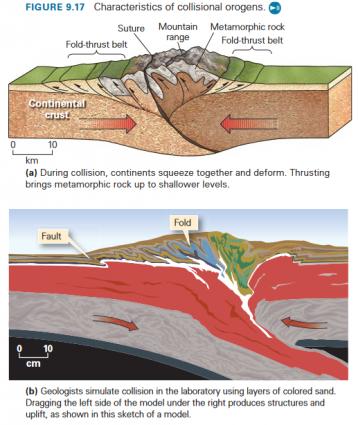
Fig. 9.17 in Stephen Marshak, Essentials of Geology Fourth Edition, 2013, New York: W. W. Norton & Company, p. 281
Note that while this type of mountain formation results in crustal "roots" (thickening), the increased crustal thickness extends all along the length of the mountain range, so does not resemble a peg.
Alleged function as pegs
Sometimes pictures of mountains used on Islamic videos and websites depict the crust protruding down into the lithospheric mantle (the upper mantle), giving the misleading impression that they "peg" the crust to it. In fact this layer and the crust are both part of the lithosphere and move together as an entire lithospheric plate (tectonic plate) before mountains form at the boundaries of subduction and continental plate collision. The lithosphere moves over the asthenosphere, which is molten mantle and not a solid object into which something can be "pegged". Mountain ranges can also lose their root when delamination occurs, for example at the East Anatolian Plataeu.[34] An image illustrating a section of the Tibetan Plateau which has also experienced delamination is shown below.
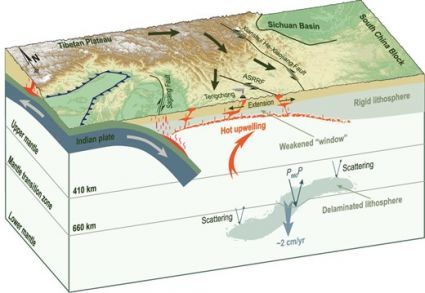
.
It could be added that far more significant downwards protrusions into the molten asthenosphere are the subducted slabs of lithosphere which descend into the molten mantle at plate boundaries, and are sometimes in a state of partial detachment. Another example of downward protruding material which is far more substantial than crustal roots are craton keels. Cratons are stable regions of the earth's crust that are no longer subject to mountain building processes. Craton keels are deep extensions of cratons into the mantle which extend any where from 60-300km below the surface. These keels extend far deeper than crustal (mountain) roots. The formation of these craton roots, or keels, is, however, unrelated to mountains or their formation.[36]
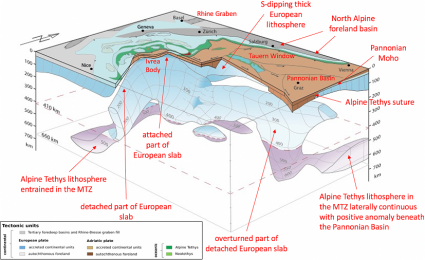
Subducted slabs are far more significant downward protrusions than the crustal thickening which occurs beneath some mountain ranges.
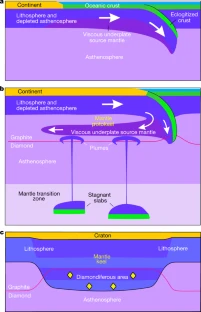
These too are much larger downward protrusions than the crustal thickening which occurs during any mountain formation process.
Mountains prevent the Earth from moving / convulsing / inclining
A number of attempts are commonly made to interpret the following verses in light of modern science.
As mentioned above, the word describing the mountains in these verses is l-rawāsiya (the steadfast, anchored, anchors, used to mean mountains).[4] As Tabatai & Mirsadri (2016) note:
Incidentally, the first two verses state that Allah created mountain passes for the benefit of humans. Critics would observe here that many mountain ranges are inconvenient for humans to traverse, with large detours necessary, and show no sign that they were designed with passes perfectly suited to human needs.
Refers to the earth as a whole
While it is common today to interpret the above verses as a reference to earthquakes, it is far more likely that they refer to the earth as a whole. Since the author of these verses would have known that earthquakes do in fact occur, including in Arabia itself, it is unlikely that he would have described mountains as being created lest people suffer earthquakes. The most natural reading is that "the earth" (al-ard) in these verses refer to the entire Earth. This is especially clear in Quran 31:10 and Quran 21:30-31 in which the heavens are mentioned immediately beforehand, and fits with the verse discussed above in which mountains are described as pegs or stakes.
The poem quoted above attributed to the pre-Islamic poet al-Muhalhil links the mountains (rawāsiya, like in these verses of the Quran) to the shifting/convulsing (with the same verb as these verses) of the entire earth. Similarly, the myth of The Islamic Whale on which the Earth rests according to some hadiths was narrated in terms of mountains holding down the earth to stop it moving on the back of the whale.
Verses which do seem to describe earthquakes use the words zalzalah (Quran 22:1 and Quran 99:1), or rajfatu (Quran 7:78, Quran 73:14). In contrast, the verses which state that Allah cast or placed the mountains to prevent the earth from shaking use the word tamīda, discussed in the next sub-section below.
Further evidence that the tamīda verses refer to the earth as a whole moving is found in a hadith collected by al-Tirmidhi. Its authenticity is graded hasan (good) by Dar-us-Salam, though regardless, this hadith provides linguistic evidence on the meaning of tamīda in relation to the earth as a whole.
Prominent Qur'anic commentator Ibn Kathir also says in his tafsir:
Similarly, Tafsir Al-Jalalayn,another prominent Sunni commentary says:
The meaning of tamīda (move, convulse, incline to one side)
The word translated shift in the above quoted verses is tamīda (from the root ميد). According to Lane's Lexicon, the meanings of this word include to be in a state of motion, convulsion, turn, twist, contort, to incline to one side. Lane even mentions regarding this word a tradition which held that the earth was inclined on its side before mountains were formed.[12]
مَادَ, aor. يَمِيدُ, inf. n. مَيْدٌ (Ṣ, L, Mṣb, Ḳ) and مَيَدَانٌ, (L, Mṣb, Ḳ,) It (a thing) was, or became in a state of motion, or commotion; was, or became agitated: (Ṣ, L, Mṣb, Ḳ:) or, in a state of violent motion or commotion; or violently agitated. (El-Basáïr, TA.) So in the expression in the Ḳur, [xvi. 15; and xxxi. 9;] أَنْ تَمِيدَ بِكُمْ Lest it (the earth) should be convulsed with you, and go round with you, and move you about violently. (El-Basáïr, TA.) مَادَ It turned or twisted about, or became contorted and convulsed. (IḲṭṭ.) [...]
مَادَ, inf. n. مَيْدٌ and مَيَدَانٌ, It inclined to one side: as the earth is, in a trad., described to have done before the mountains were formed. (L.)The usage of this word further supports the interpretation that these verses refer to mountains anchoring the earth as a whole from moving in such a manner.
It is clear that the author of the Quran sought to describe some purposeful benefit for which he supposed mountains had been created. This desire is fulfilled by such a (mistaken) conception of mountains. Other interpretations which seek to interpret mountains as protecting humans from the effects of plate tectonics or earthquakes falter when one considers that an all-powerful creator of the heavens and earth would have been capable of actually ending all dangerous geological activity before humans arrived on the scene. Instead, some mountain ranges are in regions that are still geologically active, while other mountain ranges are in parts of the world which ceased being geologically active hundreds of millions of years before humans arrived (for example the highlands of Scotland).
The relationship between mountains and earthquakes
The most common apologetic interpretation is to claim that the Quran speaks of mountains preventing or reducing the severity of earthquakes. However, two major problems with such an interpretation are raised by critics, as set out in the subsections below: 1) Seismic amplification can sometimes mean that mountains actually increase the destruction caused by earthquakes; and 2) Destructive and deadly earthquakes do in fact occur (i.e. they are not prevented by mountains), and are correlated strongly with the location of mountain ranges due to the very nature of the underlying processes.
Mountains and the dampening (or amplification) of seismic waves
The above and similar studies are referenced by advocates as specific evidence of mountains stabilizing the Earth's crust and undermining seismic activity. Critics respond in two ways: Firstly, although the phenomenon described has a limited stabilizing effect on certain regions favorably positioned vis-à-vis the mountain range, the mountains do not prevent the earthquake outright and, more importantly, the limited dampening effect observed is only relevant if the inhabited area happens to be favorably positioned vis-à-vis the mountain range - this means that if, for instance, the city were located between the mountain and the fault line where the quake originated, even if the city was located near the foot of the mountain, then the destruction experienced by the city would not be reduced in any significant way.
Secondly, and perhaps more importantly, the topography (surface layout) of mountainous landscapes can actually amplify the seismic waves and thus the groundshaking experienced in some locations while dampening the waves elsewhere. This again depends on a number of factors such as the depth of the fault and the precise topography, but there are real studies showing this effect, both with measured seismic data and with computer modelling.
In particular, topography amplifies ground shaking at mountain tops and ridges (especially the slopes facing away from the source), while it de-amplifies it in valleys.[38] Around the world, human settlements are commonly built not only in valleys but also on mountain and hill-sides.
Seismic amplification can also occur in low-lying areas where cities are more commonly found, especially for deeper earthquakes. The image below from a study of the effect of the mountainous topography around the Taipei basin illustrates that in some circumstances an earthquake would be more destructive to the city of Taipei due to the Central Mountain Range on the Island of Taiwan than if it was surrounded by a smooth topography (click or tap the image to expand the thumbnail).
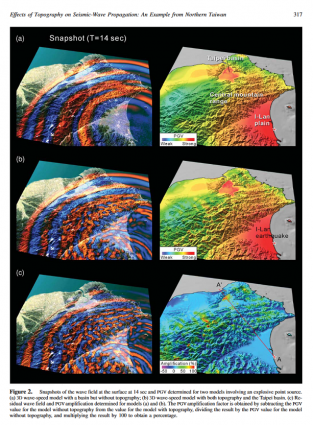
The models take into account the basin but not the mountainous topography (top) or take both into account (middle). The most significant net difference between the two (bottom) is that much of the Taipei basin experiences strongly amplified peak ground velocity (how fast any point on the ground shakes) from the earthquake when the topography of the Central Mountain Range is taken into account.
Correlation between the location of earthquakes and mountains
Critics also point out that scientists learned as early as the 1920s that earthquakes are concentrated in very specific and narrow zones arounds the planet (known as Wadati-Benioff zones). In 1954, French seismologist J.P. Rothé published a map showing the concentration of earthquakes along the zones indicated by dots and cross-hatched areas.[40]
Critics note how the earthquakes originate mainly from the edges of tectonic plates, including collisional mountain ranges and ocean trenches and ridges, which demonstrates that mountains do not stabilize the crust or the earth. The presence of mountains on any part of the Earth's surface thus often suggests the presence of precisely those underground geographical circumstances which generate earthquakes. If there were no mountains, there would also be no tectonic activity, since the two are inextricably linked, and with no tectonic activity there would be no earthquakes.
Critics cite the Himalayan mountain range as a specific example of a mountain range which, rather than preventing earthquakes, is in fact closely associated with them. The collision of tectonic plates causes mountains to form and this same collision also causes earthquakes, which explains the correlation of the two phenomena.
ASC India
Indeed, a mountainous region is often indicative of a high-earthquake frequency in the same area. Other examples of mountainous regions that are high-frequency earthquake zones include the Andes[41] and the African mountains.[42]
Amateur Seismic Centre
Many of the the largest earthquakes, including the two largest earthquakes ever recorded, are associated with mountainous regions.[43] The largest earthquake was the great Chilean earthquake, which occurred 140km south-south-west of Concepción (Biobio), Chile, registered at 9.5Mw – the Andes mountain range, evidently, did not prevent the earthquake or cause the region to be particularly stable.
The second largest earthquake was the Prince William Sound earthquake, which occurred 33.2km SE of Mt. Goode (Alaska), U.S.A., registered at 9.2Mw – Mt Goode, nearby, was of no assistance. The sixth largest earthquake was the Ecuador earthquake, which occurred 138km west of Tortuga (Esmeraldas Province), Ecuador, registered at 8.8Mw – the nearby Andes mountain range was likewise of no assistance. The eighth largest earthquake was the Arunachal Pradesh, which occurred 20.7 kilometers NW of Tajobum (Arunachal Pradesh), India, registered at 6Mw – this earthquake took place in the Assam hills and caused landslides in the mountains which, again, did not prevent or stabilize the earthquake. Such examples where formidable mountains and mountain ranges co-exist with earthquakes of immense magnitudes, critics point out, are abundant and thus undermine the idea that mountains stabilize the Earth or play any role in mitigating earthquakes.
Critics point out the largest earthquake ever recorded - the Chilean earthquake in 1960 - in particular. The U.S. Geological Survey had the following to say regarding this earthquake:
1960 May 22 19:11:14 UTC
Magnitude 9.5
The Largest Earthquake in the World
More than 2,000 killed, 3,000 injured, 2,000,000 homeless, and $550 million damage in southern Chile; tsunami caused 61 deaths, $75 million damage in Hawaii; 138 deaths and $50 million damage in Japan; 32 dead and missing in the Philippines; and $500,000 damage to the west coast of the United States.
U.S. Geological Survey, March 29, 2010
The Andes Mountains did not prevent or stabilize this earthquake. On the contrary, later research revealed that the collision of tectonic plates that caused the earthquake also caused the Andes mountains to be raised. Similar earthquakes in the past are responsible for the existence of Andes in the first place. This collision even serves as a textbook example of the general phenomena, as can be seen below.
Earth Science From Moorland School
Tectonic plate interpretations
Some advocates of the miracle claim argue that where mountains result from the collision of tectonic plates, they also cause the stability of the Earth. Maurice Bucaille in his book The Bible, the Quran and Science wrote as follows:
Critics, in response, point out the difference between cause and effect, suggesting that the advocates conflate the two. The formation of mountains is an incidental result of the collision or rifting (separation) of the tectonic plates, events which in fact cause rather than prevent earthquakes. The formation of mountains and occurance of earthquakes are thus both largely the result of destabilizing tectonic activity. They are part of the same ongoing process and one cannot exist without the other. Like earthquakes, the mountains generated at these plate boundaries and fault lines are a product of the tectonic movement and cannot be said to in any sense prevent its other effects from taking place.
Other advocates for the Quran, aware that these mountains result from and do not prevent tectonic collision, proceed differently. These advocates argue that the mountains slow the collision of continental plates down and dampen the impact. To these advocates, critics respond that what stops the collisions are simply the opposing forces of either plate. It is impossible that crustal plates collisions could occur without forming mountains since they are part of the same physical process and laws, so a special divine act of creation to create mountains is unnecessary and meaningless. To put it another way, it is nonsensical to say that the earth would shift/convulse with its inhabitants (per the Quran) if the tectonic plate collisions happened without the formation of mountains. One cannot exist without the other.
Moreover, the critics add, considering the above, these mountains are not acting in any capacity that can be described as peg-like (a better analogy might be the bumper of a car, which crumples upon collision to save the driver, for instance, from being crumpled - but this has nothing to do with pegs and does not serve the purpose of 'stabilization'). Nor does such an interpretation take account of the other types of mountain formation discussed above, for example fault block mountains which occur as plates move apart rather than together.
Mountains and isostatic stabilization
Advocates of the miracle point to George Airy's model of isostasy, which supports the idea that isostasy occurring below mountains causes mountains themselves to be more stable than if isostasy were not occurring below. This, they argue, is another point of evidence that mountains stabilize the Earth as described in the Quran. Critics respond to this argument by stating that George Airy's model says nothing special of mountains, per se, and simply demonstrates that isostasy - that is the extension of the earth's crust below the surface to a degree correlated to the height of the surface at any given point - generally causes the crust of the earth to be stable, whether or not a given area is mountainous. Moreover, they point out, the fact that a mountain's isostasy causes the mountain to stabilize 'itself' - that is, just as the isostasy of any region causes that same region to be stable - does not mean that the mountain is in any way stabilizing the Earth in general or even the surrounding region in any meaningful way. They summarize this counterargument by suggesting that, on the basis of Airy's model, it can be said that if there were a region possessing a mountain and subject to isostasy, there is no reason to believe that region would be more stable than another, similar region that did not have a mountain but was also subject to isostasy to the same, natural extent.
David Smith, Director of Professional Development, MadSci Network, Earth Sciences, March 14, 2004
Another way the critics put it is that the phenomenon of isostasy is itself responsible for the stability of the crust - whether or not the crust is host to mountains in any given region. Isostasy stabilizes mountains, even terrain, and even indented regions on the Earth's surface. The Mountains do not cause this isostasy any more than isostasy causes mountains, as isostasy is co-occurrent with any variety of terrain - mountainous or otherwise. The co-occurrent isostasy is, however, responsible for the stability of the mountains as well as the crust, and not the other way around - that is, a region excepted from the norms of isostasy (as many are) will not be as stable, whether this region is mountainous or not. Isostasy is best understood as a phenomenon separate from the mountains altogether, as it is no more bound in the simple fact of its existence to the presence of mountains than it is to region of simple, flat crust (even if the specific form it takes in either of these cases is).
Mountains and stabilization of the Earth about its axis
Some advocates of the miracles argue that while mountains do not directly stabilize the Earth's surface by functioning as pegs, their presence and the concomitant fact of the crust being thicker at certain locations due to isostasy results in an increased moment of inertia for the earth, thus reducing its rotational speed and axial tilt. Critics respond to this argument by pointing out that the relative impact of the denser crust at the locations of some mountains is infinitesimally small simply because the crust, even where it is thicker, weighs astronomically less than the Earth as a whole, which weighs 5.97*1024 kgs, such that it has no significant impact on the Earth's rotational speed or axial tilt. While scientists have acknowledged the extremely minimal impact of the mountainous crust in these respects, they have also pointed out that the Earth's rotational speed and axial tilt are more impacted by small factors such as the Earth's distance from the moon and even by the ancient effect of the post-glacial rebound since the ice ages than they are by the mountains.
Critics also argue here that it is nearly impossible to correlate this stabilization effect, how minimally real it may be, with any remotely plausible interpretation of the relevant verses.
Preventing/lest (أَن) verses 'reducing'
As has been discussed in the sections above, the apologists' claim rests on the (incorrect) assumption that mountains reduce the seismic impact of Earthquakes, (or occasionally some other kind of movement) to mean what is meant by Earth's swaying/shaking. However the Arabic word used in the verses is 'أَن / an', for 'lest'.[44]
Thought the word 'lest' has fallen out of fashion in modern English,[45] it's meaning is: in order to prevent any possibility that something will happen,[46] i.e. to stop it from happening. It also be translated as 'otherwise' in these contexts. You can see used elsewhere where you can see here, for example:
No-one would ever claim mountains actually prevent earthquakes altogether, considering they do not and in fact given the correlation between them and mountain ranges (see above), nor any of the nice alternative processes are described as being stopped altogether. The apologists have essentially used a subtle substitution of 'lest' meaning to prevent or stop, to lower/reduce/diminish the effect of, yet the Qur'an does not say 'reduce/lower shaking' etc.,[47] nor does the Qur'an say mountains prevent the Earth shaking/swaying a lot/heavily etc - so we would expect to see no shaking/swaying from whichever alleged natural process this is referring to rather than simply a minor reduction - making the entire argument invalid.
And once again, critics note that the language used here perfectly matches a pre-modern worldview of mountains being tent pegs holding down a flat Earth that outright stops it from swaying (given the lack of understanding of physics at the time of revelation), either in space or the cosmic ocean.
See Also
External Links
- Sherif Gaber - Are mountains like Pegs? - YouTube Video
- Mountains are Pegs (Quranic Miracle turning into a huge Quranic Scientific Mistake) - athiesm-vs-islam.com article on the subject
References
- ↑ Tectonic processes that create and destroy mountain belts and their components - Britannica.com
- ↑ Ibn Kathir writes under the commentary of this verse 22:47:
قال ابن أبي حاتم حدثنا الحسن بن عرفة، حدثني عبدة بن سليمان عن محمد بن عمرو عن أبي سلمة عن أبي هريرة أن رسول الله صلى الله عليه وسلم قال " يدخل فقراء المسلمين الجنة قبل الأغنياء بنصف يوم خمسمائة عام " ورواه الترمذي والنسائي من حديث الثوري عن محمد بن عمرو به، وقال الترمذي حسن صحيح. وقد رواه ابن جرير عن أبي هريرة موقوفاً، فقال حدثني يعقوب، حدثنا ابن علية، حدثنا سعيد الجريري عن أبي نضرة عن سمير بن نهار قال قال أبو هريرة يدخل فقراء المسلمين الجنة قبل الأغنياء بمقدار نصف يوم، قلت وما مقدار نصف يوم؟ قال أو ما تقرأ القرآن؟ قلت بلى، قال { وَإِنَّ يَوْماً عِندَ رَبِّكَ كَأَلْفِ سَنَةٍ مِّمَّا تَعُدُّونَ }. وقال أبو داود في آخر كتاب الملاحم من سننه حدثنا عمرو بن عثمان، حدثنا أبو المغيرة، حدثنا صفوان عن شريح بن عبيد عن سعد بن أبي وقاص عن النبي صلى الله عليه وسلم أنه قال " إني لأرجو أن لا تعجز أمتي عند ربها أن يؤخرهم نصف يوم " قيل لسعد وما نصف يوم؟ قال خمسمائة سنة. وقال ابن أبي حاتم حدثنا أحمد بن سنان، حدثنا عبد الرحمن بن مهدي عن إسرائيل عن سماك، عن عكرمة عن ابن عباس { وَإِنَّ يَوْماً عِندَ رَبِّكَ كَأَلْفِ سَنَةٍ مِّمَّا تَعُدُّونَ } قال من الأيام التي خلق الله فيها السموات والأرض. ورواه ابن جرير عن ابن بشار عن ابن المهدي، وبه قال مجاهد وعكرمة، ونص عليه أحمد بن حنبل في كتاب الرد على الجهمية، وقال مجاهد هذه الآية كقوله{ يُدَبِّرُ ٱلاَْمْرَ مِنَ ٱلسَّمَآءِ إِلَى ٱلاَْرْضِ ثُمَّ يَعْرُجُ إِلَيْهِ فِى يَوْمٍ كَانَ مِقْدَارُهُ أَلْفَ سَنَةٍ مِّمَّا تَعُدُّونَ } السجدة 5.
Rasool Allah told that the poor people will enter in the paradise half a day before the rich people, means 500 years before the rich people (while whole day is equal to 1000 years of people's reckoning). al-Tirmidhi and al-Nisai etc recorded it and al-Tirmidhi said that this tradition is 'Hasan Sahih' (i.e. authentic according to al-Tirmidhi). In another tradition, it was asked from Abu Hurayrah, how long is this half day? He replied: "Didn't you read Quran?" I said: "Yes." Upon that he recited me verse 22:47 ... Companion S'ad was asked: "How long is this half day." He replied: "500 years". Ibn Abbas recited this verse and said that this is the length of those 6 days, in which Allah created the heavens and the earth (Ibn Jarir). While Imam Ahmed bin Hanbal described it in more clear words in his book "Refutation of al-Jahmia". Mujjahid said that this verse is similar to verse 5 of Surah al-Sajdah [(Quran 32:5) He rules (all) affairs from the heavens to the earth: in the end will (all affairs) go up to Him, on a Day, the space whereof will be (as) a thousand years of your reckoning.]
- ↑ alqā أَلْقَىٰ - Lane's Lexicon, Suppliment p. 3012
See paragraph number 4 for the form IV verb definition. - ↑ 4.0 4.1 4.2 4.3 Rawās رَوَاس - Lane's Lexicon page 1087
- ↑ jaʿala جعل - Lane's Lexicon page 430
- ↑ See a variety of official translations of Verse 41:10 on Quranx.com. Note that not all do; see Ahmad Khan and Hilali & Khan,
- ↑ مَهْدً mahdan - Lane's Lexicon page 2739
- ↑ awtādan Lane's Lexicon p. 2917
- ↑ https://poetsgate.com/poem.php?pm=27780
- ↑ See p. 438, D. S. Margoliouth (1925) The Origins of Arabic Poetry The Journal of the Royal Asiatic Society of Great Britain and Ireland, No. 3 (Jul., 1925), pp. 417-449
- ↑ See also the same poem by al-Muhalhil quoted and commented on in Abdullah al-Udhari (1991) Jahili Poetry before Imru al-Qais (4000 BCE–500 CE) (archive), PhD thesis, London School of Oriental and African Studies, pp. 151-2 (his source for the poem, given in footnote 1, p. 255 with expanded reference on p. 296, is al-Balkhī (Abū Zaid Aḥmad b. Sahl), Kitāb al-Bad' wa al-Tārīkh, I) ed. Huart, Editions Earnest Leroux, 1899-1919 pp. 149-50)
- ↑ 12.0 12.1 تَمِيدَ tamīda Lane's Lexicon page 2746
- ↑ 13.0 13.1 Guillaume, A., The Life of Muhammad, London: Oxford University Press, 1955, p. 102
- ↑ دحو dahawa - Lane's Lexicon page 857
- ↑ استوت istawat - Lane's Lexicon p. 1477
- ↑ https://shamela.ws/book/12406/736
- ↑ Bravmann, M. M. (1977) Studies in Semitic Philology, Leiden: Brill p.439
- ↑ Veda | Hinduism | Britannica Entry ..No definite date can be ascribed to the composition of the Vedas, but the period of about 1500–1200 BCE is acceptable to most scholars..
- ↑ Witzel, E.J. Michael. The Origins of the World's Mythologies (p. 137). Oxford University Press. Footnote 289 (p. 470): Ṛgveda 1.19.7 etc.; Maitrāyaṇī Saṃhitā 1.10.13; Kaṭha Saṃhitā 36.7 (see above, § 2, n. 167; § 3, n. 283. Note that both the stemming part and the fixing of the Earth occur much later in mythological time than that of Heaven and Earth. Indra is a descendant of the second generation of deities. If we count the Asuras or Titans as the third generation, they are in fact the cousins of the “fourth” generation, to which Indra belongs. In Japan, the feature of preparing the land for habitation occurs again later on (cf. Aston 1972: 59). Probably in both traditions, myths were restructured restructured and attributed to the most important gods.
- ↑ Click here for a more complete view of the page scan.
- ↑ 21.0 21.1 A Brief Illustrated Guide to Understanding Islam/ B) The Quran on Mountains - Islam-Guide.com, accessed October 1, 2011
- ↑ Joseph A. DiPietro, Geology and Landscape Evolution (Second Edition), 2018 quoted at https://www.sciencedirect.com/topics/earth-and-planetary-sciences/crustal-root
- ↑ Ognev, I., Ebbing, J., and Haas, P.: Crustal structure of the Volgo–Uralian subcraton revealed by inverse and forward gravity modelling, Solid Earth, 13, 431–448, https://doi.org/10.5194/se-13-431-2022, 2022. (Open access)
- ↑ Moores, Eldridge & Yıkılmaz, M. & Kellogg, Louise. (2013). Tectonics: 50 Years after the Revolution 10.1130/2013.2500(10). pp. 347-8
- ↑ Fig. 9 in Kelemework, Y., Milano, M., La Manna, M. et al. Crustal structure in the Campanian region (Southern Apennines, Italy) from potential field modelling Sci Rep 11, 14510 (2021). https://doi.org/10.1038/s41598-021-93945-8
- ↑ Fig. 7 in Scarfì, L., Barberi, G., Barreca, G. et al. Slab narrowing in the Central Mediterranean: the Calabro-Ionian subduction zone as imaged by high resolution seismic tomography Sci Rep 8, 5178 (2018). https://doi.org/10.1038/s41598-018-23543-8
- ↑ Joseph A. DiPietro, Geology and Landscape Evolution (Second Edition), 2018 quoted at https://www.sciencedirect.com/topics/earth-and-planetary-sciences/crustal-root
- ↑ https://www.zmescience.com/feature-post/main-types-mountains-earths-ups-downs/
- ↑ Dèzes, Pierre (1999) - Tectonic and metamorphic Evolution of the Central Himalayan Domain in Southeast Zanskar (Kashmir, India) - Mémoires de Géologie. Doctoral thesis (Universite de Lausanne) 32: 149. ISSN 1015-3578
- ↑ Jaume Vergés, Manel Fernàndez, Albert Martìnez - The Pyrenean orogen: pre-, syn-, and post-collisional evolution - Journal of the Virtual Explorer, Electronic Edition, ISSN 1441-8142, volume 8, paper 4, doi:10.3809/jvirtex.2002.00058
- ↑ https://www.fawry.news/237353/where-is-the-najd-plateau-located/
- ↑ Dome Mountains - Universetoday.com
- ↑ How were Guilin's magical mountains formed?
- ↑ https://www.mn.uio.no/ceed/english/research/publications/articles/2020/delamination.pdf
- ↑ Fig. 5 in Jikun Feng, Huajian Yao, Ling Chen, Weitao Wang, Massive lithospheric delamination in southeastern Tibet facilitating continental extrusion, National Science Review, Volume 9, Issue 4, April 2022, nwab174, https://doi.org/10.1093/nsr/nwab174
- ↑ 36.0 36.1 Perchuk, A.L., Gerya, T.V., Zakharov, V.S. et al. Building cratonic keels in Precambrian plate tectonics Nature 586, 395–401 (2020). https://doi.org/10.1038/s41586-020-2806-7
- ↑ Fig. 11 in Handy, M. R., Schmid, S. M., Paffrath, M., Friederich, W., and the AlpArray Working Group: Orogenic lithosphere and slabs in the greater Alpine area – interpretations based on teleseismic P-wave tomography, Solid Earth, 12, 2633–2669, https://doi.org/10.5194/se-12-2633-2021, 2021
- ↑ Khan, S., van der Meijde, M., van der Werff, H., and Shafique, M. (2020) The impact of topography on seismic amplification during the 2005 Kashmir earthquake, Nat. Hazards Earth Syst. Sci., 20, 399–411, https://doi.org/10.5194/nhess-20-399-2020 (archive)
- ↑ Fig. 2 from Lee, Shiann-Jong & Komatitsch, Dimitri & Huang, Bor-Shouh & Tromp, Jeroen. (2009). Effects of Topography on Seismic-Wave Propagation: An Example from Northern Taiwan. Bulletin of the Seismological Society of America. 99. 10.1785/0120080020.
- ↑ Earthquake zones - U.S. Geological Survey
- ↑ Andes mts. - Volcanism and Plate Techtonics
- ↑ Earthquake Risk Alert for Africa's Mountain Regions - United Nations Environment Programme, May 6, 2002
- ↑ 10 Largest Quakes - Worldwide - Amateur Seismic Centre
- ↑ أَن - Lane's Lexicon
- ↑ BBC World Learning Service. Q&A.
- ↑ Cambridge Dictionary: Lest
- ↑ E.g. see alternative Arabic words for reducing that could have been used if that is what it meant here: Cambridge English to Arabic dictionary and here: Arabic Student's Dictionary. This does not even include potential metaphors that could have been used to express lowering.
